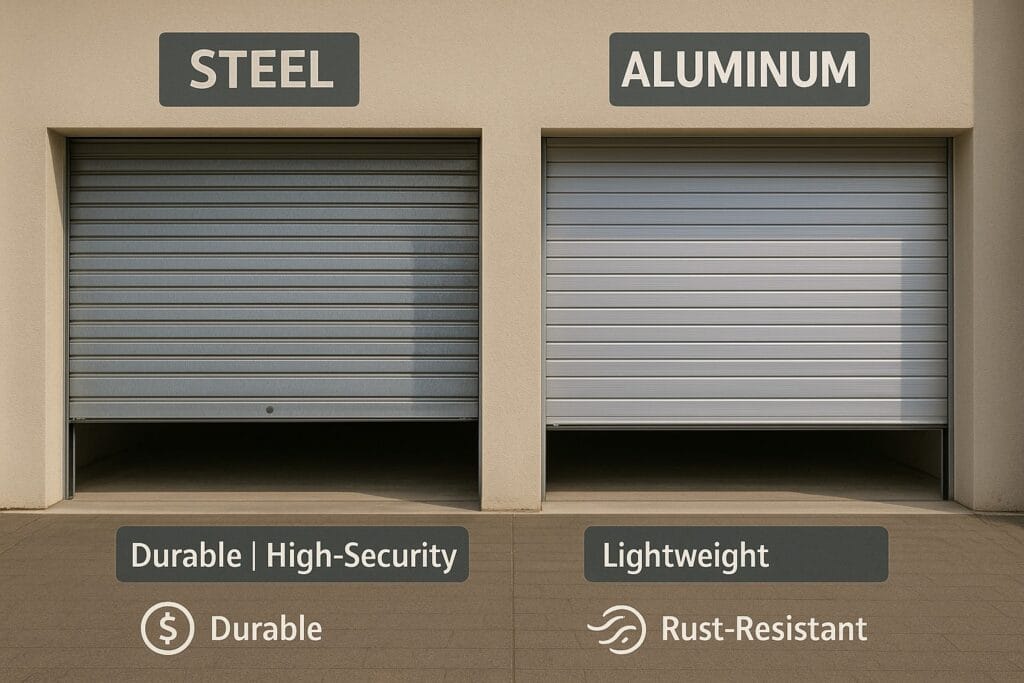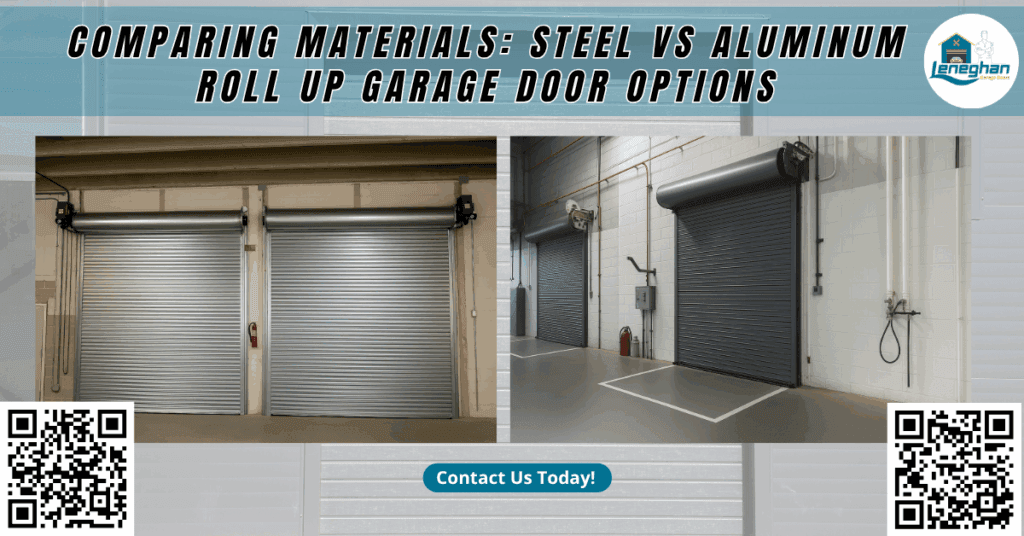Choosing the right roll-up garage door can feel overwhelming given the wide range of models, features, materials, and design standards available. Recently, a Houston-area warehouse owner contacted us at Leneghan Garage Doors after struggling for weeks to select a commercial-grade rolling sheet door. Their primary concerns were wind load certification, insulation, and long-term durability. Our expert team conducted a full site check, reviewed the building’s environmental controls, and helped them select a heavy-duty steel model with a chain hoist and insulated panels ideal for high-wind areas and frequent daily operation.
According to data from the International Door Association, roll-up doors are the fastest-growing product type for both commercial and residential applications across Texas. Roll-up garage doors are available in many material types, but the two most popular are steel and aluminum. Understanding the differences between these garage door materials, down to their wind load resistance, duty cycle, and certified standards, can help you choose the right solution for your building’s needs.
At Leneghan Garage Doors, we’ve helped customers choose from garage door models featuring custom color options, cam action devices, and heavy-duty construction that meet stringent building codes, including the Florida Building Code and International Building Code. Whether you’re installing a commercial roll door for an industrial shed or a light-duty aluminum door for a modern residential garage, we’ve broken down all the major factors you need to consider.
What Is a Roll-Up Garage Door?
A roll-up garage door, also referred to as a rolling sheet door or rolling steel door, is a space-saving solution where the sheet of steel or aluminum coils up above the door opening. This makes it ideal for both tight residential garages and commercial buildings where overhead space is limited.
Unlike traditional panel garage doors or sectional models, roll-up doors don’t require interior tracks or rails. Instead, they operate using a barrel and chain hoist system or an electric motor, which allows the door to roll into a compact coil. Popular garage door models include Mueller, Amarr, and Janus, each offering specific features such as wind load certification, available panels and colors, and duty ratings for light, medium, or heavy operation.
Roll-up doors are frequently used in applications such as auto repair garages, retail shops, sheds, industrial warehouses, and storage units due to their fast operation, durability, and ability to withstand harsh conditions like rain, wind, and fluctuating temperatures.
Steel Roll-Up Garage Doors: Strength, Insulation, and Durability
Key Features and Applications
Steel roll-up garage doors are among the most robust and versatile door models on the market. They are especially popular for heavy-duty applications such as logistics centers, storage warehouses, and industrial facilities.
- Material Strength: Steel doors are built using thick-gauge galvanized sheet metal. These doors are highly resistant to impact, making them perfect for high-risk environments like busy loading docks or areas prone to wind debris.
- Insulation Benefits: Most steel roll-up garage doors can be fitted with insulation options like polyurethane or polystyrene foam. These help control interior temperature and reduce energy bills, an essential consideration in Houston’s humid climate.
- Wind Load Certification: Many models meet certified wind load standards and are approved by the Florida Building Code and International Building Code, ensuring they remain intact even under hurricane-force winds.
- Safety Features: Heavy-duty steel doors can include cam-action devices, auto-latching systems, and safety brakes to prevent accidental slamming.
Limitations and Considerations
- Weight and Operation: Steel is heavier than aluminum, which may require a more powerful motor or chain system for smooth operation. This increases installation time and costs.
- Corrosion Risk: If not coated with durable polyester paint or protected from moisture, steel doors can rust, especially in areas with high humidity or poor masonry drainage.
- Cost and Lead Time: Steel doors often cost more upfront due to material and installation labor. Additionally, customized doors may take several weeks to ship.
Aluminum Roll-Up Garage Doors: Lightweight, Economical, and Sleek
Advantages and Best Uses
Aluminum roll-up garage doors are popular in both residential settings and light-duty commercial applications. Their lightweight nature makes them easier to operate and install.
- Corrosion Resistance: Unlike steel, aluminum won’t rust, making it an excellent option for coastal areas or buildings with poor environmental controls.
- Ease of Installation: Lightweight construction makes for a faster installation process, which is ideal for tight schedules or quick site upgrades.
- Aesthetic Flexibility: Available in a wide range of colors and finishes, aluminum roll-up doors can be powder-coated or anodized to match nearly any design preference.
- Economic Alternative: Aluminum doors are often more affordable and available with shorter lead times than steel.
Challenges and Trade-Offs
- Lower Durability: While aluminum won’t rust, it is more prone to dents, especially in high-traffic areas. It may not be suitable for industrial applications or garages that require frequent loading/unloading.
- Limited Wind Load Ratings: Most aluminum models do not offer certified wind load options unless specifically upgraded, making them less suitable for hurricane zones or high-rise buildings.
- Insulation Limitations: Aluminum doors typically lack thick insulation options. Unless customized, they do not meet stringent energy efficiency standards.
Steel vs Aluminum: A Detailed Comparison Chart
| Feature | Steel Roll-Up Door | Aluminum Roll-Up Door |
| Material Type | Galvanized steel sheet | Lightweight aluminum |
| Durability | Excellent – impact and weather-resistant | Moderate – prone to denting |
| Insulation Options | Yes – polyurethane/polystyrene available | Limited – usually uninsulated |
| Wind Load | Certified wind load models available | Wind-rated models limited |
| Corrosion Resistance | Moderate – requires protective coating | High – naturally rustproof |
| Cost Range | Higher upfront; varies by size and features | More affordable; great for quick installations |
| Ideal Applications | Industrial, commercial, heavy-duty field applications | Retail shops, storage sheds, light-duty garages |
| Duty Rating | Heavy-duty or high-cycle | Light-duty or medium-cycle |
| Available Sizes | Up to several thousand square feet | Typically smaller footprint |
| Standards Met | Meets stringent codes (IBC, FBC, local building codes) | Meets basic residential standards unless upgraded |
| Finish Options | Durable polyester paint, custom powder coating | Anodized, painted, or powder-coated surfaces |
| Common Brands | Janus model features, Amarr model features, Mueller industrial | Janus, Amarr, and custom sheet suppliers |
| Warranty | Up to 10-year or longer depending on model | Typically 1-3 year limited warranty |

Local Houston Considerations for Roll-Up Garage Doors
Houston’s building codes and environmental conditions require extra diligence when choosing your door. A proper site check is essential to determine whether your garage or commercial address requires certified wind load ratings or waterproof seals.
Steel doors with insulated panels and high-cycle mechanisms are ideal for areas exposed to wind, rail vibration, or industrial activity. On the other hand, aluminum doors are preferred for garages near masonry walls, smaller sheds, or aesthetic-driven spaces like retail showrooms.
We often recommend conducting a garage inspection before selecting a door. Latch mechanisms, size requirements, local building code compliance, and square footage constraints all play a role in determining the best garage door model for your needs.
How Can Leneghan Garage Doors Help You?
Whether you’re looking to install a light-duty aluminum garage door in your backyard shed or need a commercial steel roll-up solution for a multi-site warehouse operation, Leneghan Garage Doors has the expertise to help.
Our certified team handles:
- Product selection and site check evaluations
- Garage door installation and maintenance scheduling
- Custom panels and available colors installation
- Wind load-certified models that meet Houston building codes
- Chain hoist and cam action device upgrades
📍 Visit Us: 3025 Kirby Dr, Houston, TX 77098
📞 Call Now: (281) 867-6656
Get a free quote and consultation. Our local Houston team is here to guide you through the process with professionalism, speed, and unmatched quality.
Frequently Asked Questions (FAQs)
1. Can roll-up garage doors be automated with remote openers?
Yes, both steel and aluminum roll-up garage doors can be fitted with electric motors and remote control openers for easier operation.
2. Are roll-up doors available with windows?
Yes, select models come with window options for natural light, although they may impact insulation and security slightly.
3. How long does a roll-up garage door installation take?
Most installations take between 4 to 8 hours, depending on size, door model, and on-site preparation.
4. Can I paint or customize my roll-up door later?
Yes, many models with durable polyester paint or powder coatings can be repainted or refinished to match future aesthetic changes.


